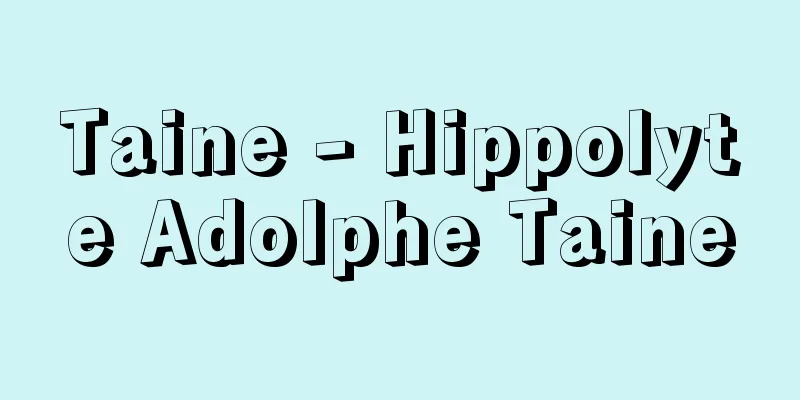Taine - Hippolyte Adolphe Taine

|
French philosopher, critic, and historian. A thinker who provided a theoretical foundation for French realism and naturalism in literature. Born April 21 in Bouziers, Ardennes. A brilliant student who entered the École Normale Supérieure at the top of his class, he was persecuted by the academic world because his Condillac-esque sensualist philosophy was incompatible with the eclecticism that was the mainstream of lecture hall philosophy at the time, and his path to becoming a university professor was blocked. He remained active in the academic world until 1864, when he took over as professor of aesthetics and art history at the École des Beaux-Arts. His book "French Philosophers of the Nineteenth Century" (published in 1857, retitled in 1868) was a critique of eclecticism and positivism using a clear philosophical method. His five-volume "History of English Literature" (1864-1869) influenced the world's literary trends, including Japan's Shoyo Tsubouchi. In the introduction, he argues that literature and art are determined by the three major factors of race, environment, and era, as well as the primary functions of writers and artists. His "Philosophy of Art" (1882) was the culmination of his lectures on aesthetics and art history at the School of Fine Arts, and his unfinished "The Origin of Modern France" (1875-1893), which explores the roots of the French Revolution in the past, is a representative work of his conservative side. His other philosophical and psychological work is "Discourse on the Knowledge" (1870). He was a member of the Academic Society. He died in Paris on March 5, 1893. [Makoto Yokohari May 19, 2015] "An Introduction to the History of English Literature" translated by Noboru Hiraoka (included in "World Thought Culture Collection No. 9 (Modern Literary Thought)", 1963, Kawade Shobo Shinsha) " "Philosophy of Art" translated by Satoshi Hirose (1937, Tokyodo) " "The Origins of Modern France" translated by Shinkichi Okada (2 volumes, Kadokawa Bunko)" Source: Shogakukan Encyclopedia Nipponica About Encyclopedia Nipponica Information | Legend |
|
フランスの哲学者、批評家、歴史家。フランスの写実主義・自然主義文学に理論的根拠を与えた思想家。4月21日、アルデンヌ県ブージエに生まれる。高等師範学校(エコール・ノルマル・シュペリュール)に首席入学の俊秀であったが、彼のコンディヤック風な感覚論哲学が当時の講壇哲学の主流折衷主義と相いれなかったため学界の迫害を被り、大学教授への道をふさがれる。1864年美術学校で美学、芸術史講座を担当するまで論壇で活躍する。 明確な哲学的方法による折衷主義、実証主義批判の書が『19世紀のフランス哲学者』(1857年刊、1868年改題)。『イギリス文学史』5巻(1864~1869)は日本の坪内逍遙(つぼうちしょうよう)らに至るまで世界の文芸思潮に影響を及ぼした。序論で、文学、芸術は人種、環境、時代の三大因子と作家、芸術家の主要機能によって規定されると説く。『芸術哲学』(1882)は美術学校の美学、芸術史講義の結実であり、フランスにおける革命の病根を過去に探る未完の『現代フランスの起源』(1875~1893)は保守的側面を代表する書である。ほかに哲学的、心理学的著作『知性論』(1870)がある。アカデミー会員。1893年3月5日パリで没。 [横張 誠 2015年5月19日] 『平岡昇訳『イギリス文学史序論』(『世界思想教養全集 第9(近代の文芸思想)』所収・1963・河出書房新社)』▽『広瀬哲士訳『芸術哲学』(1937・東京堂)』▽『岡田真吉訳『近代フランスの起源』2冊(角川文庫)』 出典 小学館 日本大百科全書(ニッポニカ)日本大百科全書(ニッポニカ)について 情報 | 凡例 |
<<: Hand towel (tenugui) - Tenugui
Recommend
Agassiz, Lake (English spelling) Agassiz Lake
The lake is a long, narrow lake stretching from n...
Geórgios Karaiskákis
1780‐1827 A general in the Greek War of Independen...
cuckoo spit
...The bubbles of the larvae are very conspicuous...
Night Watchman State (English: Nachtwächterstaat German)
The capitalist view of the state from the mid-17t...
Nango [village] - Nango
A village in Sannohe County, southeastern Aomori P...
Hippocampus mohnikei (English spelling) Hippocampusmohnikei
…[Isao Hanyu]. … *Some of the terminology that me...
Otokojima
An uninhabited island located at the northern end ...
Shiogama [city] - Shiogama
A city in central Miyagi Prefecture. It was incorp...
Wang Zhen
…Womb breathing is the ultimate breathing techniq...
Praeneste (English spelling)
A city in the Latium region of ancient Italy. Toda...
Karakoram [mountain range] - Karakoram
A mountain range that runs parallel to the western...
Attendant - Zuihyo
〘 noun 〙 (old name: zuibyou)① A soldier who accomp...
Bark - Juhi
The trunks, branches, and roots of trees grow and...
Party Ban - Touko no Kin
A series of oppression incidents that occurred in...
Wall weaving - Kabeidoori
〘 noun 〙 Silk fabric woven with wall thread as the...









